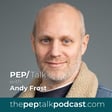
With Natasha Moore
All the way from Australia, today Andy speaks with Natasha Moore on PEP Talk. Both there and here in the UK, there are similar needs to speak into our changing cultures, whilst retaining the winsomeness and grace that remains attractive whether we have a public platform or a private conversation.
Natasha Moore is a Senior Research Fellow at the Centre for Public Christianity. She has a PhD in English Literature from the University of Cambridge and is the author of For the Love of God: How the church is better and worse than you ever imagined and, most recently, The Pleasures of Pessimism. She has worked for CPX since 2014 and written on topics that include books, movies, politics, food, domestic violence, Scripture in schools, war, Thanksgiving, and freedom of speech.



















